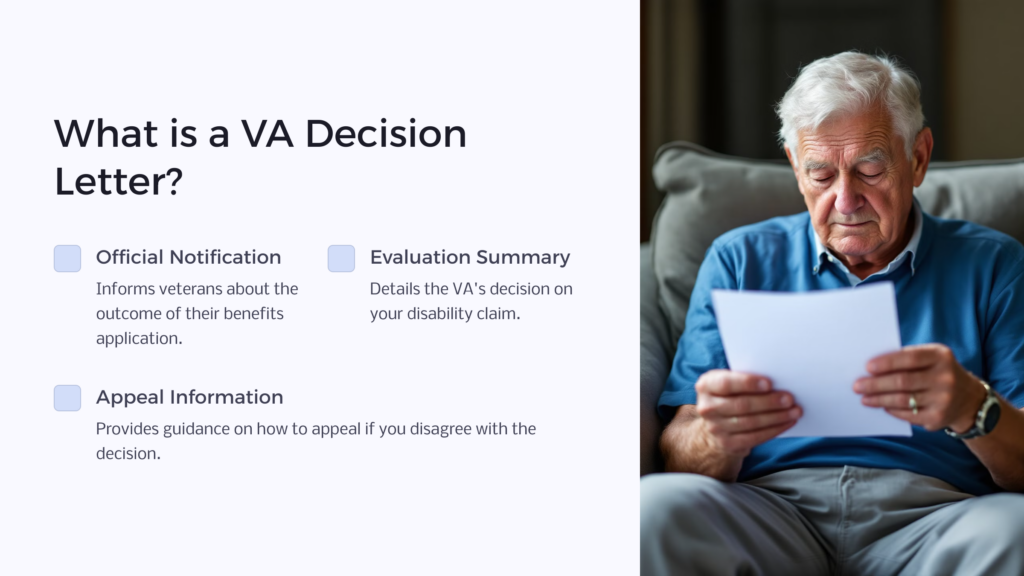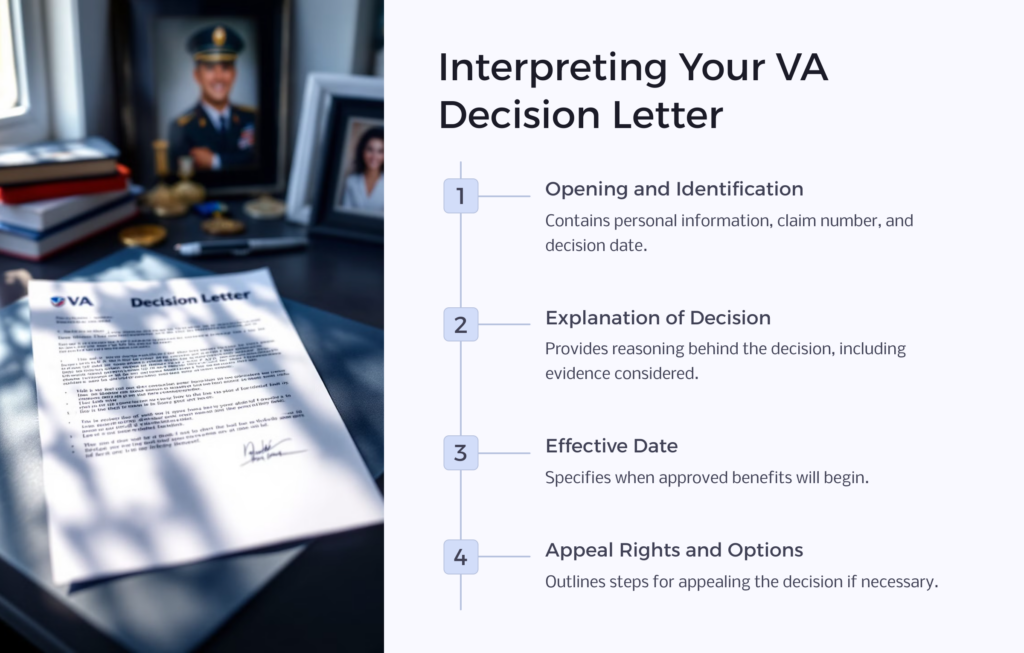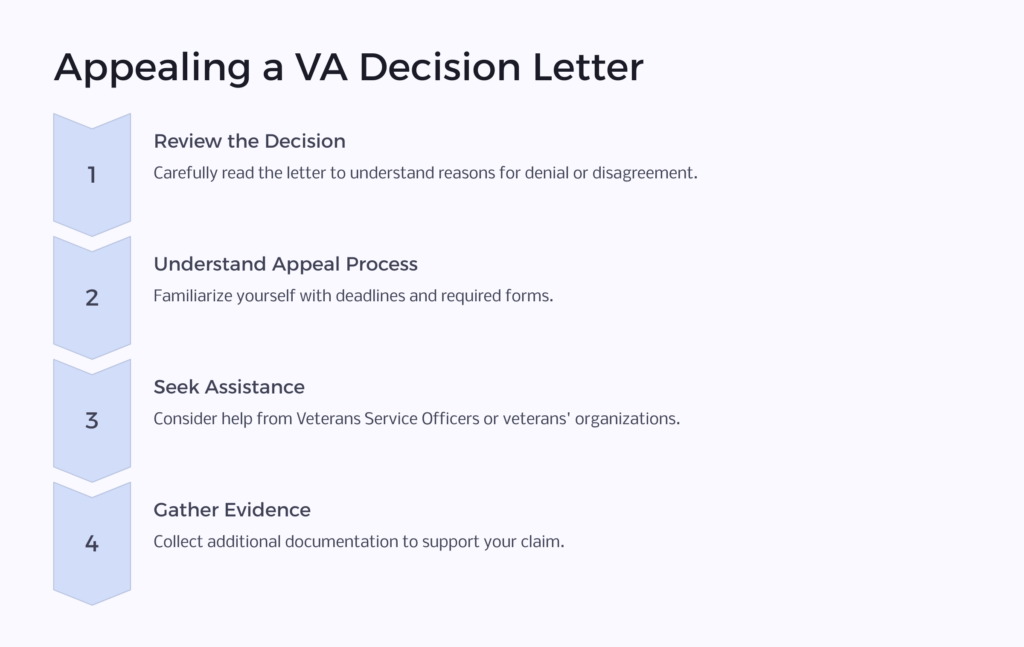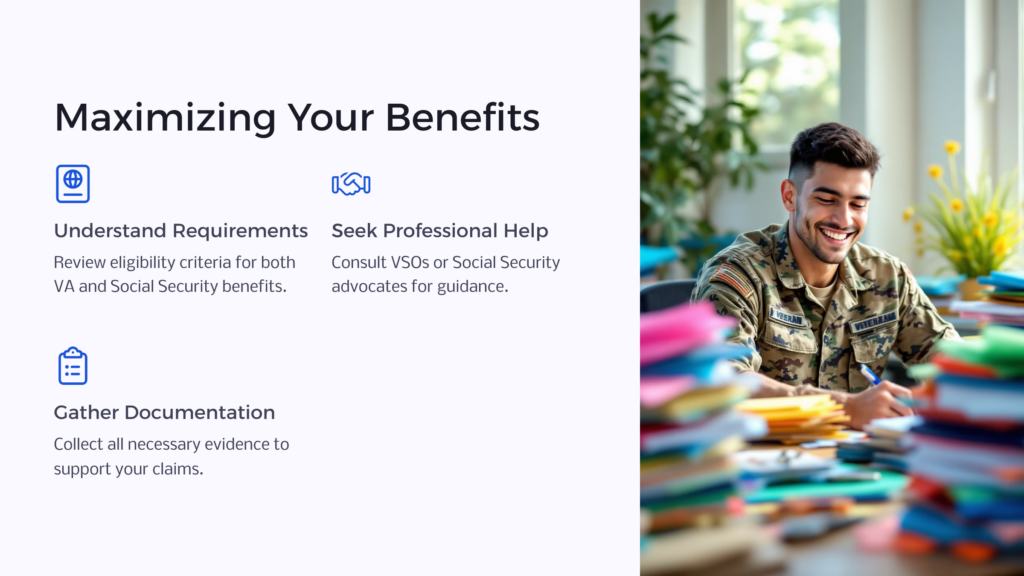When it comes to obtaining benefits, understanding the VA decision letter is essential. This letter serves as the official notification from the Department of Veterans Affairs (VA) regarding your benefits claim. It outlines the VA’s decision on your application, detailing whether your claim has been approved, denied, or requires further decision review.
The VA decision letter is more than just a piece of paper; it holds the potential to significantly impact your life. It can determine whether you receive vital financial assistance, medical benefits, or other support tailored to your needs.
Comprehending the contents of this letter and its implications is crucial for veterans seeking the benefits they are eligible for.
In this article, we will delve deeper into the elements of a VA decision letter, dissect its key components, and explain their significance. We will also guide you through the steps to qualify for the VA disability benefits you rightfully deserve.
What is a VA decision letter?

A VA Decision Letter is a crucial document generated by the Department of Veterans Affairs (VA) that informs veterans about the outcome of their benefits application and the decision review of your VA claim. This letter serves as the official notification, detailing the VA’s decision on your disability claim for benefits.
Now, you might be wondering how this letter came to be. After you’ve submitted your application for benefits, the VA thoroughly reviews your case, considering factors such as your service history, medical records, and supporting documentation. They carefully evaluate your eligibility for various benefits, such as disability compensation, pension, health care, or vocational rehabilitation.
Once this evaluation process is complete, the VA generates a decision letter. This letter summarizes the outcome of their assessment and communicates whether your claim has been approved, denied, or requires further review or additional evidence. You may receive the letter by mail, although in some cases, it may be accessible electronically to view the letter online or check your claim status through the VA’s online portal.
The purpose of the VA Decision Letter is twofold. First and foremost, it serves to inform you of the VA’s decision on your benefits claim. This allows you to understand the outcome and the reasoning behind it. If your claim is approved, the letter outlines the benefits you are eligible to receive and any accompanying conditions or requirements.
Secondly, the VA Decision Letter plays a crucial role in the veterans’ benefits process because it establishes the basis for your appeal rights. If you believe the decision made by the VA is incorrect or if you’re dissatisfied with the outcome, the letter provides you with information on how to appeal the decision. It outlines the steps you can take to present additional evidence, request a review, or seek further assistance to pursue the benefits you believe you deserve.
Understanding the Impact on Benefits Application
The VA Decision Letter holds significant influence over the benefits application process, as it directly impacts whether your claim is approved, denied, or requires further review.
When you receive the VA Decision Letter, it’s a moment of truth. If your claim is approved, congratulations are in order! The VA letter will outline the specific benefits you are eligible for, such as disability compensation, pension, healthcare, or vocational rehabilitation. It serves as an official confirmation that the VA acknowledges your service-related condition and is prepared to provide the support you need.
On the other hand, receiving a denial letter can be disheartening. However, it’s important not to lose hope. The denial letter should provide you with valuable information about the reasons behind the decision.
It may cite insufficient evidence, conflicting documentation, an insufficient disability rating, or other factors that influenced the outcome. Understanding the specific grounds for denial is crucial, as it allows you to address those concerns when pursuing an appeal or reapplication.
Now, let’s say your claim requires further review or additional evidence. In this case, the VA Decision Letter acts as a roadmap, guiding you on the next steps to take. It may specify the information or documentation needed to support your claim. Be sure to pay close attention to these instructions and promptly provide the requested materials. Remember, this is an opportunity to strengthen your case and increase the chances of a favorable outcome.
How to Interpret Your VA Decision Letter

Interpreting your VA Decision Letter can be a daunting task, especially if you’re unfamiliar with the terminology and content used. However, by breaking it down and understanding its key components, you can gain valuable insights into the decision made and its implications. You can view, download, and share your VA letter without stress. Let’s navigate through the letter together and shed light on its interpretation.
Opening and Identification
The letter typically begins with a formal greeting and includes your personal information, such as your name, claim number, and date of the decision. Take note of this information for future reference and verification.
Explanation of the Decision
This section of the letter provides detailed information on the reasoning behind the decision. It may outline the evidence considered, medical opinions, or any other factors that influenced the outcome. Pay close attention to this part, as it helps you understand the specific grounds for the decision made.
Effective Date
If your claim is approved, the letter will specify the effective date of your VA disability benefits. This is the date from which you can expect to receive financial assistance or other forms of support. Understanding the effective date is crucial for financial planning and managing your benefits.
Appeal Rights and Options
If your claim is denied or if you disagree with the decision, the letter should provide information on your appeal rights and options. It will outline the steps you can take to pursue an appeal, including the deadlines, VA form for a veterans appeal, and additional evidence requirements.
Appealing a VA Decision Letter

If you find yourself disagreeing with the decision stated in your VA Decision Letter, there are different decision review options. You have the right to appeal the decision and present additional evidence to support your case. Let’s walk through the process of appealing a VA decision so that you can understand your options and take appropriate action.
Review the Decision Letter
Carefully read through the VA Decision Letter to understand the specific reasons for the denial or the aspects that you disagree with. This will help you identify the areas that need further attention and evidence.
Understand the Appeal Process
The letter should provide instructions on how to initiate an appeal. Familiarize yourself with the appeal process, including deadlines and any required VA form. Be sure to note the timeframe within which you must submit your appeal to avoid any potential delays.
Seek Assistance
Consider seeking assistance from a Veterans Service Officer (VSO) or a veterans’ organization. These professionals are knowledgeable about the appeals process and can provide guidance on gathering additional evidence, completing forms, and presenting your case effectively. Their expertise can greatly enhance your chances of success.
Gather Additional Evidence
Take the opportunity to gather additional evidence that supports your VA disability claim. This may include medical records, expert opinions, or any other documentation that strengthens your case. Ensure that the evidence directly addresses the reasons for denial or disagreement mentioned in the VA Decision Letter.
Submitting the Appeal
Prepare and submit your appeal according to the instructions provided in the VA Decision Letter. Pay close attention to any required forms, supporting documents, or specific procedures outlined by the VA. Timely submission of your appeal is crucial, as missing deadlines may result in your appeal being dismissed.
Await a Decision
Once your appeal is submitted, the VA will review your case again, considering the newly submitted evidence and any additional information provided. This review may involve a reevaluation of your claim by different VA officials or a decision by the Board of Veterans’ Appeals, depending on the stage of the appeals process.
Continue to Communicate
Throughout the appeals process, maintain open communication with the VA and respond promptly to any requests for additional information or clarification. Staying engaged and proactive can help move your claim status forward efficiently.
VA Decision Letter vs. Social Security Benefits Eligibility
While both share the common goal of providing support to individuals, the criteria and processes involved can vary.
VA Benefits Eligibility: The Department of Veterans Affairs (VA) provides benefits to eligible veterans based on their service-related conditions, disabilities, or other qualifying factors.
Service Requirements: You must have served in the military, generally meeting specific active duty or reserve duty requirements.
Disability or Condition: VA benefits often require a service-connected disability or condition, meaning that your disability or condition must have resulted from or been aggravated by your military service.
Character of Discharge: In most cases, you must have received an honorable or general discharge from military service. Certain benefits may have additional requirements for discharge status.
Social Security Benefits Eligibility: Social Security benefits, on the other hand, are administered by the Social Security Administration (SSA) and aim to provide financial support to individuals who meet specific criteria.
Work Credits: Social Security benefits are based on your work history and the number of work credits you have earned through paying social security taxes. The specific number of credits required depends on your age at the time of applying for benefits.
Disability or Retirement: Social security benefits include retirement benefits, which are based on your age and work history, as well as disability benefits for individuals with severe, long-term disabilities that prevent them from working.
Medical Evidence: For social security disability benefits, you need to provide medical evidence demonstrating that your disability meets the SSA’s definition of disability and prevents you from engaging in substantial gainful activity.
To maximize your chances of qualifying for both VA benefits and social security benefits, it’s important to:
Understand the eligibility requirements for each program and gather the necessary documentation to support your claims.
Seek assistance from professionals such as Veterans Service Officers (VSOs) or social security advocates who can guide you through the application processes and help ensure you meet the necessary criteria. Feel free to search for free helpful resources online, including checking the Decision Letter FAQ.
It’s worth noting that eligibility for one program does not guarantee eligibility for the other. They are separate entities with their own distinct requirements. Therefore, it’s important to evaluate your circumstances, review the eligibility criteria for each program, and pursue the benefits that align with your specific situation.
Conclusion

The VA Decision Letter is a crucial document that informs veterans of the outcome of their benefit claim. It plays a significant role in the VA benefit application process, and understanding its contents and implications is essential.
If you disagree with the decision stated in the VA Decision Letter, you have the right to appeal. Seek assistance, gather additional evidence, and follow the instructions provided in the letter to initiate the appeals process.
For further assistance and information on Social Security benefits or medical evidence for a VA claim, contact us, where you’ll find helpful resources and tools to navigate the benefits application process.
 Benefits.com Advisors
Benefits.com Advisors
With expertise spanning local, state, and federal benefit programs, our team is dedicated to guiding individuals towards the perfect program tailored to their unique circumstances.
Rise to the top with Peak Benefits!
Join our Peak Benefits Newsletter for the latest news, resources, and offers on all things government benefits.





















